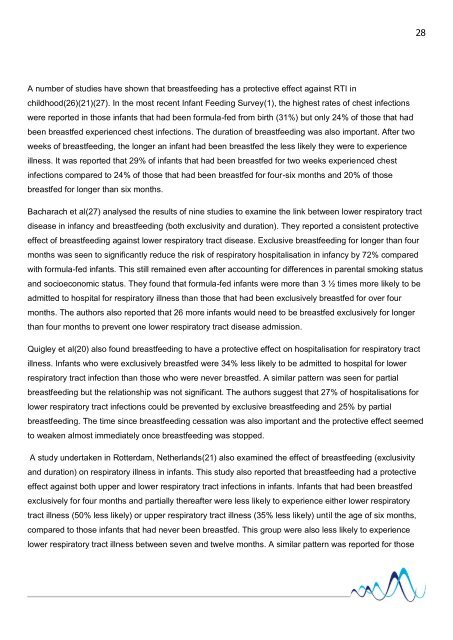Infant Feeding in Leicester City - East Midlands Public Health ...
Infant Feeding in Leicester City - East Midlands Public Health ...
Infant Feeding in Leicester City - East Midlands Public Health ...
You also want an ePaper? Increase the reach of your titles
YUMPU automatically turns print PDFs into web optimized ePapers that Google loves.
28A number of studies have shown that breastfeed<strong>in</strong>g has a protective effect aga<strong>in</strong>st RTI <strong>in</strong>childhood(26)(21)(27). In the most recent <strong>Infant</strong> <strong>Feed<strong>in</strong>g</strong> Survey(1), the highest rates of chest <strong>in</strong>fectionswere reported <strong>in</strong> those <strong>in</strong>fants that had been formula-fed from birth (31%) but only 24% of those that hadbeen breastfed experienced chest <strong>in</strong>fections. The duration of breastfeed<strong>in</strong>g was also important. After twoweeks of breastfeed<strong>in</strong>g, the longer an <strong>in</strong>fant had been breastfed the less likely they were to experienceillness. It was reported that 29% of <strong>in</strong>fants that had been breastfed for two weeks experienced chest<strong>in</strong>fections compared to 24% of those that had been breastfed for four-six months and 20% of thosebreastfed for longer than six months.Bacharach et al(27) analysed the results of n<strong>in</strong>e studies to exam<strong>in</strong>e the l<strong>in</strong>k between lower respiratory tractdisease <strong>in</strong> <strong>in</strong>fancy and breastfeed<strong>in</strong>g (both exclusivity and duration). They reported a consistent protectiveeffect of breastfeed<strong>in</strong>g aga<strong>in</strong>st lower respiratory tract disease. Exclusive breastfeed<strong>in</strong>g for longer than fourmonths was seen to significantly reduce the risk of respiratory hospitalisation <strong>in</strong> <strong>in</strong>fancy by 72% comparedwith formula-fed <strong>in</strong>fants. This still rema<strong>in</strong>ed even after account<strong>in</strong>g for differences <strong>in</strong> parental smok<strong>in</strong>g statusand socioeconomic status. They found that formula-fed <strong>in</strong>fants were more than 3 ½ times more likely to beadmitted to hospital for respiratory illness than those that had been exclusively breastfed for over fourmonths. The authors also reported that 26 more <strong>in</strong>fants would need to be breastfed exclusively for longerthan four months to prevent one lower respiratory tract disease admission.Quigley et al(20) also found breastfeed<strong>in</strong>g to have a protective effect on hospitalisation for respiratory tractillness. <strong>Infant</strong>s who were exclusively breastfed were 34% less likely to be admitted to hospital for lowerrespiratory tract <strong>in</strong>fection than those who were never breastfed. A similar pattern was seen for partialbreastfeed<strong>in</strong>g but the relationship was not significant. The authors suggest that 27% of hospitalisations forlower respiratory tract <strong>in</strong>fections could be prevented by exclusive breastfeed<strong>in</strong>g and 25% by partialbreastfeed<strong>in</strong>g. The time s<strong>in</strong>ce breastfeed<strong>in</strong>g cessation was also important and the protective effect seemedto weaken almost immediately once breastfeed<strong>in</strong>g was stopped.A study undertaken <strong>in</strong> Rotterdam, Netherlands(21) also exam<strong>in</strong>ed the effect of breastfeed<strong>in</strong>g (exclusivityand duration) on respiratory illness <strong>in</strong> <strong>in</strong>fants. This study also reported that breastfeed<strong>in</strong>g had a protectiveeffect aga<strong>in</strong>st both upper and lower respiratory tract <strong>in</strong>fections <strong>in</strong> <strong>in</strong>fants. <strong>Infant</strong>s that had been breastfedexclusively for four months and partially thereafter were less likely to experience either lower respiratorytract illness (50% less likely) or upper respiratory tract illness (35% less likely) until the age of six months,compared to those <strong>in</strong>fants that had never been breastfed. This group were also less likely to experiencelower respiratory tract illness between seven and twelve months. A similar pattern was reported for those


